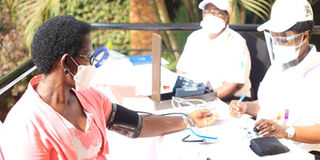Move to deal with lifestyle disease at national level takes shape

Ministry of Health PS Dr Diana Atwine testing for blood pressure.
What you need to know:
- Since launching in Kenya six years ago and subsequently expanding to Ethiopia in 2016, Tanzania in 2018, Ghana in 2019 and Uganda in 2020, HHA has conducted over 15.5 million blood pressure screenings in the community and in healthcare facilities; trained over 7,290 healthcare workers, to provide education and awareness, screening and treatment services for hypertension; activated 800 healthcare facilities in Africa to provide hypertension services, and identified over 2.8 million elevated blood pressure readings.
- The programme in Uganda will also screen for respiratory conditions, such as chronic obstructive pulmonary disease (COPD) and asthma, a significant burden on low and middle-income countries.
In an efforts to reign in on high blood pressure, also called hypertension, which is blood pressure that is higher than normal, three important institution, namely; AstraZeneca, Uganda’s Ministry of Health (MoH) and the Uganda Protestant Medical Bureau (UPMB) have launched an initiative that should help Ugandans decrease the burden of dealing with lifestyle diseases.
The Healthy Heart Africa programme will be implemented on a national level in Uganda, following the signing of a Memorandum of Understanding (MoU) that paved the way for implementation of the initiative in May this year.
“Aimed at contributing to the prevention and control of hypertension and decreasing the burden of cardiovascular disease in Uganda, the partnership is designed to strengthen the provision of services for hypertension, including raising awareness of lifestyle risk factors for CVDs using MoH guidelines to standardise care,” reads a joint statement issued this weekend.
Talking numbers
In 2014, the national STEPwise survey in Uganda revealed that 24.3 percent of Ugandans had elevated blood pressure while the country’s pre-hypertension rate was at 37 percent.
According to the survey data, 70 percent of the respondents had never had their blood pressure measured and 76 percent of those with raised blood pressure were untreated.
In addition, the survey revealed that a majority of people with high blood pressure were not aware of their status and that approximately one in ten people have more than three risk factors for hypertension.
Speaking during the launch of the programme last week, the Permanent Secretary, Uganda’s Ministry of Health, Dr Diana Atwine Kanzira, noted: “Non-communicable diseases (NCDs) are becoming an increasing burden on our health care system and their increase is being attributed to lifestyle changes.”
The 2014 STEPwise survey pointed to a high prevalence of risk factors such as tobacco use, alcohol abuse and obesity among respondents
Relevance
Armed with the findings of the survey, the implementation of the Healthy Heart Africa programme on the national level not only seems justified but comes in handy as well. The programmes calls for increased and sustain awareness and prevention campaigns. The programme also aligns with ongoing objective of managing NCDs through community sensitizations, training of healthcare workers and the supply of basic equipment.
The national launch follows a series of regional launches that have taken place in South-Western Region (Mbarara), Eastern Region (Jinja)and Central Region (Mityana), which saw local communities receive free blood pressure screening, alongside efforts to raise awareness and increase education around the disease and its risk factors.
The Vice President, Sustainability & Access to Healthcare, Global Sustainability at AstraZeneca, Ashling Mulvaney, said in a statement: “COVID-19 has highlighted that partnership and investment in health care needs to be targeted towards prevention and sustainable treatment provision in order to build resilient health systems.
She continued: “Our partnership with the Ministry of Health and the Uganda Protestant Medical Bureau will work to address this gap, tackling low awareness levels of NCDs and their risk factors in the country.
“Ultimately, our aim is to work together to reduce deaths and disabilities caused by hypertension and cardiovascular diseases and decrease presentation of NCDs in late stages.”
According to Executive Director, Uganda Protestant Medical Bureau, Dr Tonny Tumwesigye, as a result of the programme, hypertension healthcare will be closer to the people.
This is because approximately 80 percent of the member institutions are located in rural and poor communities. This will be leveraged to implement community based interventions and improve access to healthcare in vulnerable communities as well as strengthen health systems through training of healthcare providers.




